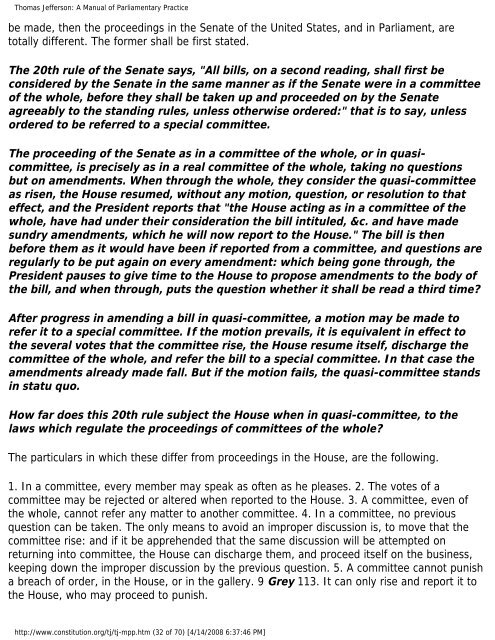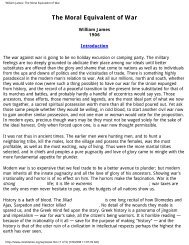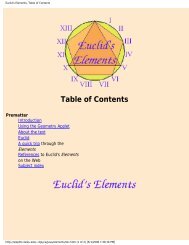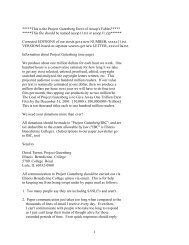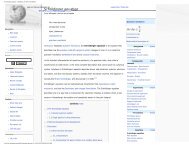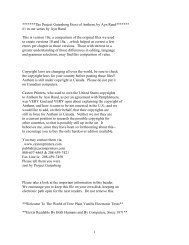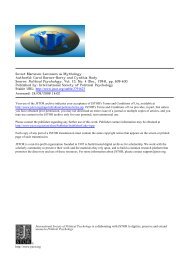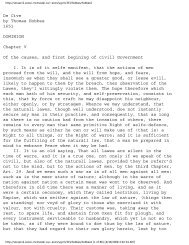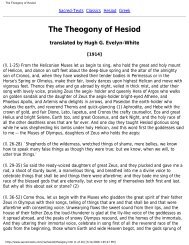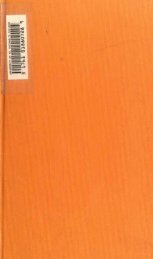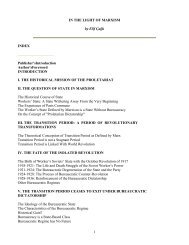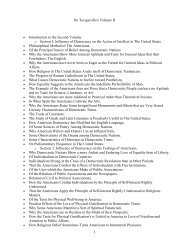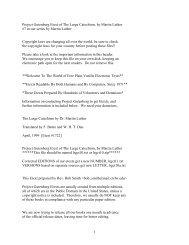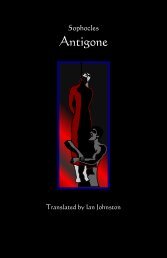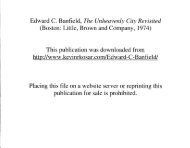Thomas Jefferson: A Manual of Parliamentary Practice
Thomas Jefferson: A Manual of Parliamentary Practice
Thomas Jefferson: A Manual of Parliamentary Practice
You also want an ePaper? Increase the reach of your titles
YUMPU automatically turns print PDFs into web optimized ePapers that Google loves.
<strong>Thomas</strong> <strong>Jefferson</strong>: A <strong>Manual</strong> <strong>of</strong> <strong>Parliamentary</strong> <strong>Practice</strong><br />
be made, then the proceedings in the Senate <strong>of</strong> the United States, and in Parliament, are<br />
totally different. The former shall be first stated.<br />
The 20th rule <strong>of</strong> the Senate says, "All bills, on a second reading, shall first be<br />
considered by the Senate in the same manner as if the Senate were in a committee<br />
<strong>of</strong> the whole, before they shall be taken up and proceeded on by the Senate<br />
agreeably to the standing rules, unless otherwise ordered:" that is to say, unless<br />
ordered to be referred to a special committee.<br />
The proceeding <strong>of</strong> the Senate as in a committee <strong>of</strong> the whole, or in quasicommittee,<br />
is precisely as in a real committee <strong>of</strong> the whole, taking no questions<br />
but on amendments. When through the whole, they consider the quasi-committee<br />
as risen, the House resumed, without any motion, question, or resolution to that<br />
effect, and the President reports that "the House acting as in a committee <strong>of</strong> the<br />
whole, have had under their consideration the bill intituled, &c. and have made<br />
sundry amendments, which he will now report to the House." The bill is then<br />
before them as it would have been if reported from a committee, and questions are<br />
regularly to be put again on every amendment: which being gone through, the<br />
President pauses to give time to the House to propose amendments to the body <strong>of</strong><br />
the bill, and when through, puts the question whether it shall be read a third time<br />
After progress in amending a bill in quasi-committee, a motion may be made to<br />
refer it to a special committee. If the motion prevails, it is equivalent in effect to<br />
the several votes that the committee rise, the House resume itself, discharge the<br />
committee <strong>of</strong> the whole, and refer the bill to a special committee. In that case the<br />
amendments already made fall. But if the motion fails, the quasi-committee stands<br />
in statu quo.<br />
How far does this 20th rule subject the House when in quasi-committee, to the<br />
laws which regulate the proceedings <strong>of</strong> committees <strong>of</strong> the whole<br />
The particulars in which these differ from proceedings in the House, are the following.<br />
1. In a committee, every member may speak as <strong>of</strong>ten as he pleases. 2. The votes <strong>of</strong> a<br />
committee may be rejected or altered when reported to the House. 3. A committee, even <strong>of</strong><br />
the whole, cannot refer any matter to another committee. 4. In a committee, no previous<br />
question can be taken. The only means to avoid an improper discussion is, to move that the<br />
committee rise: and if it be apprehended that the same discussion will be attempted on<br />
returning into committee, the House can discharge them, and proceed itself on the business,<br />
keeping down the improper discussion by the previous question. 5. A committee cannot punish<br />
a breach <strong>of</strong> order, in the House, or in the gallery. 9 Grey 113. It can only rise and report it to<br />
the House, who may proceed to punish.<br />
http://www.constitution.org/tj/tj-mpp.htm (32 <strong>of</strong> 70) [4/14/2008 6:37:46 PM]


